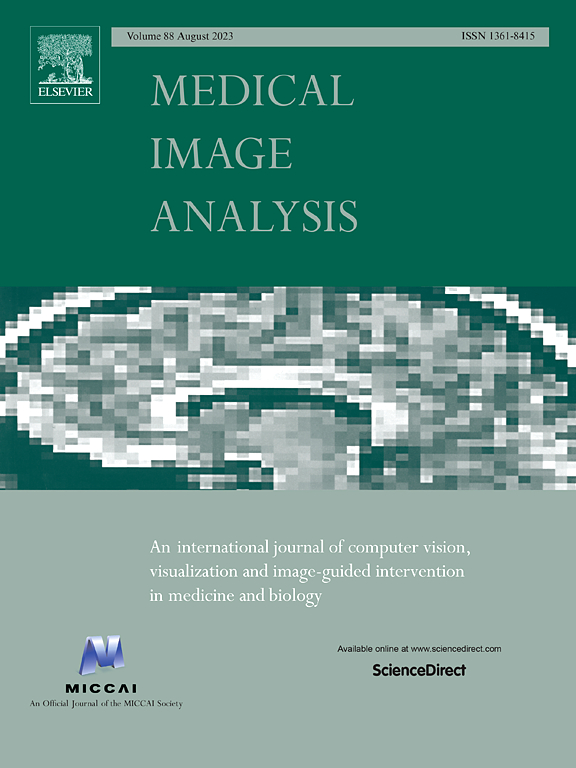Joint coil sensitivity and motion correction in parallel MRI with a self-calibrating score-based diffusion model
IF 10.7
1区 医学
Q1 COMPUTER SCIENCE, ARTIFICIAL INTELLIGENCE
引用次数: 0
Abstract
Magnetic Resonance Imaging (MRI) stands as a powerful modality in clinical diagnosis. However, it faces challenges such as long acquisition time and vulnerability to motion-induced artifacts. While many existing motion correction algorithms have shown success, most fail to account for the impact of motion artifacts on coil sensitivity map (CSM) estimation during fast MRI reconstruction. This oversight can lead to significant performance degradation, as errors in the estimated CSMs can propagate and compromise motion correction. In this work, we propose JSMoCo, a novel method for jointly estimating motion parameters and time-varying coil sensitivity maps for under-sampled MRI reconstruction. The joint estimation presents a highly ill-posed inverse problem due to the increased number of unknowns. To address this challenge, we leverage score-based diffusion models as powerful priors and apply MRI physical principles to effectively constrain the solution space. Specifically, we parameterize rigid motion with trainable variables and model CSMs as polynomial functions. A Gibbs sampler is employed to ensure system consistency between the sensitivity maps and the reconstructed images, effectively preventing error propagation from pre-estimated sensitivity maps to the final reconstructed images. We evaluate JSMoCo through 2D and 3D motion correction experiments on simulated motion-corrupted fastMRI dataset and in-vivo real MRI brain scans. The results demonstrate that JSMoCo successfully reconstructs high-quality MRI images from under-sampled k-space data, achieving robust motion correction by accurately estimating time-varying coil sensitivities. The code is available at https://github.com/MeijiTian/JSMoCo.
基于自校准分数扩散模型的并联MRI关节线圈灵敏度和运动校正
磁共振成像(MRI)是临床诊断中一种强有力的手段。然而,它面临着采集时间长、易受运动诱发伪影影响等挑战。虽然许多现有的运动校正算法已经取得了成功,但大多数算法未能考虑到快速MRI重建过程中运动伪影对线圈灵敏度图(CSM)估计的影响。这种疏忽可能导致显著的性能下降,因为估计的csm中的错误可能会传播并损害运动校正。在这项工作中,我们提出了JSMoCo,一种联合估计运动参数和时变线圈灵敏度图的新方法,用于欠采样MRI重建。由于未知量的增加,联合估计出现了高度不适定的逆问题。为了解决这一挑战,我们利用基于分数的扩散模型作为强大的先验,并应用MRI物理原理来有效地约束解空间。具体来说,我们用可训练的变量参数化刚性运动,并将csm建模为多项式函数。Gibbs采样器保证了灵敏度图与重建图像的系统一致性,有效防止了误差从预估灵敏度图传播到最终重建图像。我们通过模拟运动损坏的fastMRI数据集和活体真实MRI脑部扫描的2D和3D运动校正实验来评估JSMoCo。结果表明,JSMoCo成功地从欠采样k空间数据中重建高质量的MRI图像,通过准确估计时变线圈灵敏度实现鲁棒运动校正。代码可在https://github.com/MeijiTian/JSMoCo上获得。
本文章由计算机程序翻译,如有差异,请以英文原文为准。
求助全文
约1分钟内获得全文
求助全文
来源期刊

Medical image analysis
工程技术-工程:生物医学
CiteScore
22.10
自引率
6.40%
发文量
309
审稿时长
6.6 months
期刊介绍:
Medical Image Analysis serves as a platform for sharing new research findings in the realm of medical and biological image analysis, with a focus on applications of computer vision, virtual reality, and robotics to biomedical imaging challenges. The journal prioritizes the publication of high-quality, original papers contributing to the fundamental science of processing, analyzing, and utilizing medical and biological images. It welcomes approaches utilizing biomedical image datasets across all spatial scales, from molecular/cellular imaging to tissue/organ imaging.
 求助内容:
求助内容: 应助结果提醒方式:
应助结果提醒方式:


